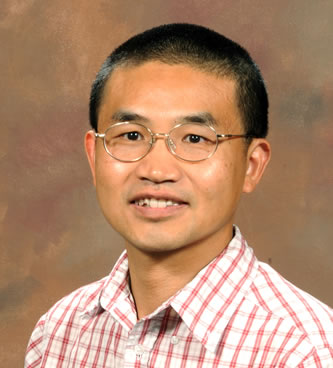Professor
PhD (Human Population Genetics), University of Texas, Houston, TX, 2003
| CONTACT INFORMATION | |
|---|---|
| (706) 721-4697 | |
 |
AE-1018 |
| hxu@augusta.edu | |

Statistical Genetics and Genetic Epidemiology; High-throughput Data Analysis; Computational genomics; Bioinformatics and Biostatistics; Human Population and Evolutionary Genetics .
Dr. Xu received his B.S. in biophysics at Fudan University, Shanghai, China. Then he moved on to genetic research for his M.S. in genetics. During this period, he participated in many joint research projects between the Institute of Genetics, Fudan University and Chinese National Human Genome Center at Shanghai, where he received training in human genome research from data generation to data analysis. Upon graduation, he was admitted to the Human and Molecular Genetics program at the University of Texas-Graduate School of Biomedical Sciences at Houston as a Ph.D. student and worked as a research assistant in the Human Genetics Center, UT-Health Science Center at Houston, where he received systematic trainings in human population and statistical genetics. He did his postdoctoral training at the Computational Genetics Section, Department of Epidemiology, the University of Texas M. D. Anderson Cancer Center. The major focus of his postdoctoral training is statistical genetics and genetic epidemiology. His postdoctoral training was supported by donor-sponsored Dauphin Postdoctoral Fellowship in Cancer Prevention.
The long-term research goals of Dr. Xu's laboratory are to characterize patterns of genetic variation from high-throughput genomic data and to use this information to address fundamental problems in the context of human complex diseases and evolution. To this end, the research projects are pursued in two broad and interrelated areas: 1) human population and evolutionary genomics and 2) elucidating the genetic architecture of complex diseases of public health significance, such as cardiovascular disease, type 2 diabetes, various cancers and mental diseases, and studying functional genomics. Theoretical, statistical, and computational tools are being developed, including linkage & linkage disequilibrium based approaches and admixture mapping of complex diseases.
Here are some recent software by Dr. Xu's group.
Biological Sequence Analysis, Statistical Genetics, High-throughput Data Analysis, Computational Statistics